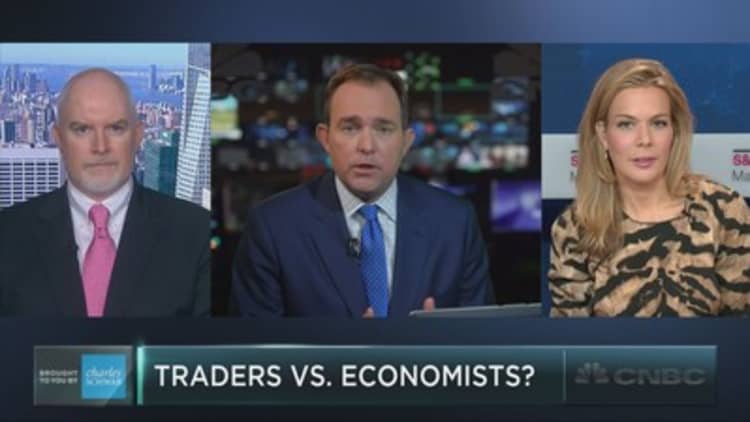
Economists are expecting to learn that 175,000 jobs were created in September as recorded by the non-farm payrolls metric, well short of the 204,000 average monthly gain seen over the past year.
So why are traders appearing to gear for a strong report?
The U.S. two-year Treasury note yield has risen substantially in the past week, due to what appears to be rising speculation that the Federal Reserve will raise rates in December.
According to Erin Gibbs, chief equity investment officer at S&P Global, recent economic data have been stronger than the jobs report is expected to be.
"We've been seeing some positive economic news come out recently that has really reassured investors over the last five days," Gibbs said Thursday on CNBC's "Trading Nation."
Among such data points is the ISM manufacturing index, which beat expectations, as did the ISM non-manufacturing index, when paired with what Gibbs calls more "hawkish" remarks from Federal Reserve chairs.
"Implied probability of a December rate stands at 62%. But oddly economists' survey only predicts non-farm payrolls to be 172,000 jobs on Friday," Gibbs wrote to CNBC in an e-mail. "Economists and investors seem to be at odds. Who is right?"
Yet while the bond market is pricing in a higher chance of a rate hike, the options market remains curiously quiescent.
"I'm overwhelmed by how people are underwhelmed in the options market," ahead of the jobs report, Dennis Davitt, chief investment officer at Harvest Volatility Management, said Thursday on CNBC's "Trading Nation."
Davitt pointed out that the CBOE Volatility Index, which measures the desire to hedge long portfolios, is below 13 — well below its long-term average of 20.
Interestingly, Neil Azous of research firm Rareview Macro says that even a weak jobs report will not dramatically reduce rate hike expectations.
"Positions are just too deeply embedded, and sentiment is shifting too fast towards an interest rate hike," Azous wrote Thursday in a note.
"The key point here is that even with a job number that is above the range that nobody currently has confidence in, you're somewhat capped out on how much the front-end of the US yield curve and the US dollar could rise," he added.





